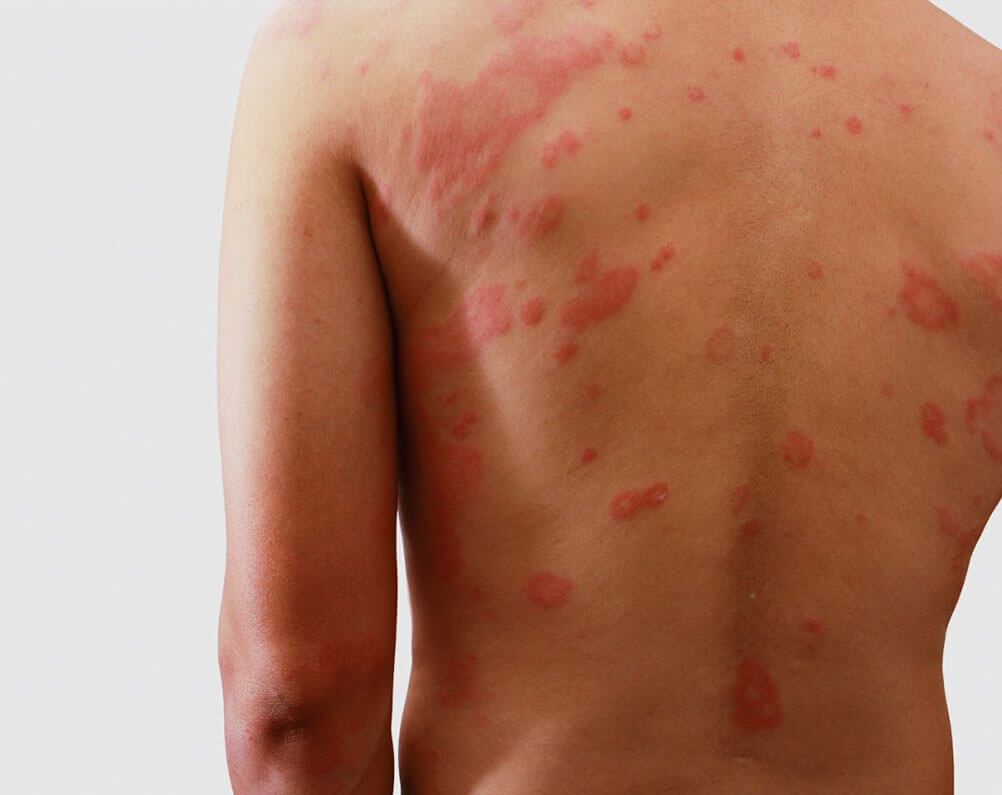PSORIASIS TREATMENT IN NORTHWOOD & HARLEY STREET
Psoriasis is a common skin problem affecting about 2% of the population. It occurs equally in men and women at any age and tends to come and go unpredictably. It is not infectious and does not scar the skin.
The skin is a complex organ made up of several different layers. The outer layer of skin (the epidermis) contains cells which are formed at the bottom and then move up towards the surface, gradually changing as they go, finally dying before they are shed from the surface. This process normally takes between 3 and 4 weeks. In psoriasis, the rate of turnover is dramatically increased within the affected skin, so cells are formed and shed in as little as 3 or 4 days. There is also inflammation and blood vessel proliferation on the affected skin; the reasons for these are still not fully understood.
Book ConsultationWHAT CAUSES PSORIASIS
Some people are more likely to develop psoriasis than others, particularly if there is someone else in their family who has psoriasis. However, the trigger for psoriasis to appear is often an outside event, such as a throat infection, stress, or an injury to the skin.
In practice, for most patients who develop psoriasis, or for whom it clears and then comes back, no obvious cause can be detected. Sunlight usually improves psoriasis, though overexposure can make it worse. A high alcohol intake and smoking can worsen psoriasis, as can medicines used for other conditions such as lithium, certain malaria tablets, and other drugs such as beta blockers (medicines commonly used to treat angina and high blood pressure). There is no apparent relationship between diet and psoriasis.

Your Consultation
At the Cedars Dermatology Clinic in Northwood & Harley Street, we draw deeply from the consultation process. Our expert clinicians will listen carefully to understand your skin concerns and aesthetic and medical goals.
- Your medical history is taken into account
- We thoroughly assess your skin
- We listen well to understand your concerns and goals
- We draw up a personalised treatment plan
FAQS about Psoriasis Treatments
This term refers to treatment with various forms of ultraviolet light, sometimes assisted by taking particular tablets. It is helpful if the psoriasis is extensive, or fails to clear with topical treatment, or comes back quickly after seeming to clear. Topical therapy will usually continue during phototherapy.
Specialised machines are used to deliver two types of ultraviolet (UV) light: UVA and UVB. These are different parts of normal sunlight. Treatment with UVA is helped by taking a medication known as a psoralen – a combination known as PUVA therapy. Treatment with UVB does not need tablets.
Both UVB and PUVA treatments have to be given with great care, and you will have to come up to the skin department 2 or 3 times a week for a number of weeks. Full details are given in other leaflets issued by the British Association of Dermatologists ( Treatments for moderate and severe psoriasis and Phototherapy ).
Treatments that are applied directly to the skin are known as topical therapies. They include creams, ointments, pastes and lotions. If your psoriasis is mild, topical therapies will be the mainstay of your treatment. Topical treatments include the following:
- Emollients. Emollients reduce scaling and can be used as often as needed.
- Salicylic acid. Preparations containing salicylic acid can help heavily scaled plaques.
- Topical steroids. Weaker steroids often do not work very well on thick patches of psoriasis but may do better on the face or in the skin folds. The stronger ones have possible side effects, one of which is to make your skin thinner. Your doctor will monitor their use closely. Psoriasis sometimes comes back quickly when topical steroid treatment stops.
- Tar preparations. Taking a medicated tar bath may help to remove loose scales. Tar creams or ointments help most patients but may be messy and can stain clothing.
- Dithranol. This can be used at home for minor or moderate psoriasis. Patients may be also treated in specialized units in hospitals. Dithranol may be effective on patients with thick plaque psoriasis, however, it is rarely used nowadays since it may irritate the skin and also it stains not only the skin and clothing, but baths and showers.
- Vitamin D analogues. There are several vitamin D preparations used to treat psoriasis: calcipotriol, calcitriol and tacalcitol. They are safe, clean to use and do not stain the skin. Treatment is applied either once (tacalcitol) or twice (calcipotriol and calcitriol) daily and can go on for as long as required. Irritation may occur, especially on the face, buttocks and genitals, and these treatments should be applied to those areas only on the specific instructions of your doctor.
- Vitamin A analogues. Tazarotene is a vitamin A gel that is applied once daily to patches of psoriasis. Irritation may occur if it is applied to the face or skin folds. It is important to tell your doctor if you are pregnant or breast-feeding. You should avoid becoming pregnant during your treatment.
- Skin folds and the face. A weak steroid, a vitamin D derivative or topical immunosuppressant creams or ointments, or a tar preparation, may be prescribed for use once or twice a day. These can also be combined to increase efficacy. Regular review by your doctor will ensure that the quantities used stay within safe limits.
- The scalp. A medicated tar or coconut oil shampoo may be used in addition to a steroid or calcipotriol scalp lotion. Tar or coconut oil preparations should be rubbed thoroughly into the scalp at night and washed out the next morning with a tar shampoo. Wearing a shower cap overnight helps the treatment to penetrate and protects your pillowcase from stains.
- The nails. There is no reliably effective treatment. Nails should be trimmed to prevent them catching.
Topical immunosuppressant medications, also called calcineurin inhibitors, Tacrolimus and Pimecrolimus, are creams or ointments that are used mainly for eczema but can be effective and safe on treating psoriasis on special areas like face, folds, or genitals.
In cases where the disease is very extensive or severe, patients may need oral treatment, though each of the tablets presents potential risks. In addition, you will usually have to continue with some topical therapy even though you are taking tablets.
Your dermatologist will discuss the risks with you if you start on this kind of treatment. All of the tablets will require blood tests, and many interfere with other medicines. Female patients should not become pregnant whilst on any tablets for psoriasis, and with some of them it is important that male patients should not father a child.
Oral treatments include acitretin (related to vitamin A), ciclosporin (suppresses the immune system), methotrexate (slows down the rate at which the skin cells are dividing in psoriasis), and hydroxycarbamide (formerly known as hydroxyurea – also slows down the rate at which the skin cells are dividing).
There are also several injectable forms of treatment available for severe forms of psoriasis. These are biologic medications that target more specific components of the defence system, including adalimumab, ustekinumab, etanercept, and infliximab.
Other treatments







